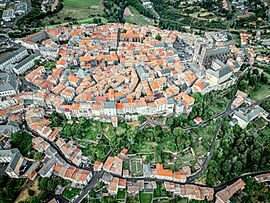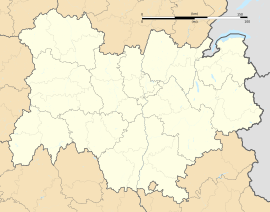Saint-Flour facts for kids
Quick facts for kids
Saint-Flour
|
|||
|---|---|---|---|
|
Subprefecture and commune
|
|||

Aerial view of Saint-Flour
|
|||
|
|||
| Country | France | ||
| Region | Auvergne-Rhône-Alpes | ||
| Department | Cantal | ||
| Arrondissement | Saint-Flour | ||
| Canton | Saint-Flour-1 and 2 | ||
| Intercommunality | Saint-Flour Communauté | ||
| Area
1
|
27.14 km2 (10.48 sq mi) | ||
| Population
(2021)
|
6,423 | ||
| • Density | 236.66/km2 (612.95/sq mi) | ||
| Time zone | UTC+01:00 (CET) | ||
| • Summer (DST) | UTC+02:00 (CEST) | ||
| INSEE/Postal code |
15187 /15100
|
||
| Elevation | 757–1,040 m (2,484–3,412 ft) (avg. 783 m or 2,569 ft) |
||
| 1 French Land Register data, which excludes lakes, ponds, glaciers > 1 km2 (0.386 sq mi or 247 acres) and river estuaries. | |||
Saint-Flour is a town in south-central France. It is located in the Cantal area, about 100 kilometers (62 miles) south of Clermont-Ferrand. People who live in Saint-Flour are called Sanflorains.
Contents
Exploring Saint-Flour's Location
The town of Saint-Flour is built in two main parts. The "upper city" (called ville haute) sits on a high, steep volcanic rock. The "lower city" (called ville basse or "Faubourg") stretches along the banks of the Ander river. This makes Saint-Flour a very unique place to visit!
A Look Back at Saint-Flour's History
People have lived in the Saint-Flour area for a very long time.
Ancient Times and Roman Influence
You can find many ancient stone structures called dolmens nearby. These show that people lived here during the Bronze Age. The Romans also had a presence here. They built two Roman villas, which were like large country houses. The Roman name for this small settlement was Indiciacum.
How Saint-Flour Got Its Name
Long ago, a person named Florus of Lodève came to this valley. He is believed to have been the first bishop of Lodève. He helped spread Christianity in the area. People say he struck a rock with his staff, and a holy spring appeared. This spring was honored for many centuries. The town eventually took its name from Florus.
The Town's Beginnings in the Middle Ages
The town we know today started to grow around the year 1000. It formed around a monastery built on the high rock in 996. This monastery was first a small prayer house. Over time, it grew bigger.
In 1095, Pope Urban II visited Saint-Flour. He blessed the new church of the abbey. This church was dedicated to three important figures: Saint-Sauveur, Saint Pierre, and Saint Flour. Later, in 1317, the diocese of Saint-Flour was officially created by Pope John XXII. A diocese is an area managed by a bishop.
Saint-Flour During the French Revolution
During the French Revolution, the town's name was changed several times. It was called Fort-Cantal'l, Fort-Libre, and Mont-Flour. But in 1793, it went back to its original name, Saint-Flour. For a short time, from 1790 to 1795, Saint-Flour was the main city (called préfecture) of the new department. After that, Aurillac became the main city.
Famous People from Saint-Flour
Some interesting people were born in Saint-Flour.
Bernart Amoros, the Troubadour
A troubadour named Bernart Amoros was from Saint-Flour. Troubadours were poets and musicians in the Middle Ages. He wrote that he came from "Saint Flor de Planeza."
Pierre-Laurent Buirette de Belloy, the Playwright
Pierre-Laurent Buirette de Belloy (1727–1795) was a famous French poet and playwright. He wrote a well-known play about the Siege of Calais. He was born right here in Saint-Flour.
Learning About Probability: The Summer School
Saint-Flour hosts an annual summer school called the École d'Eté de Probabilités de Saint-Flour. This school teaches about probability theory, which is a branch of mathematics. It started in 1971 and is supported by several important groups, including Clermont Auvergne University.
Important Buildings and Landmarks
Saint-Flour has many beautiful and historic buildings.
Saint-Flour Cathedral
The Saint-Flour Cathedral is a stunning Gothic church. It was built in the 15th century. Inside, you can see a special black Christ statue, colorful stained-glass windows showing the story of Florus, and old paintings of Hell and Purgatory. It also has impressive organs.
Notre-Dame Collegiale
This building is also in the Gothic style and dates back to the 14th century. In the 1800s, it was used as a market for selling grain. It was restored between 2005 and 2008. Now, it features a beautiful rose window and a bronze door designed by the artist Francesco Marino Di Teana.
Saint Vincent Church
The Saint Vincent Church is another Gothic-style church. It shows how important religion was in Saint-Flour during the Middle Ages. This church has been used for many different things over time. It was once a convent for the Jacobins, then a court, a Masonic temple, and a monastery. Since 1960, it has been recognized as a monument historique, which means it's a protected historical site.
In the church, amazing old paintings from the 15th century were found. These paintings show Saint Anna, who was the mother of the Virgin Mary. They are a tribute from the Dominicans to her.
Images for kids
See also
 In Spanish: Saint-Flour (Cantal) para niños
In Spanish: Saint-Flour (Cantal) para niños
 | Selma Burke |
 | Pauline Powell Burns |
 | Frederick J. Brown |
 | Robert Blackburn |










